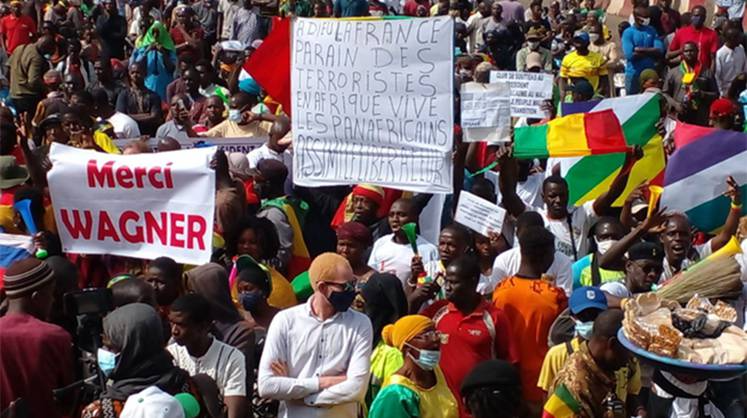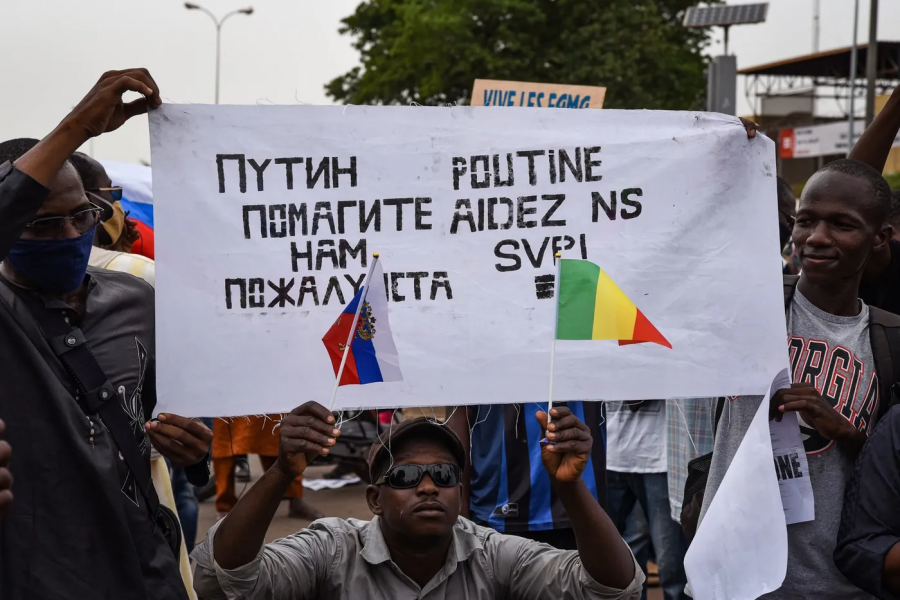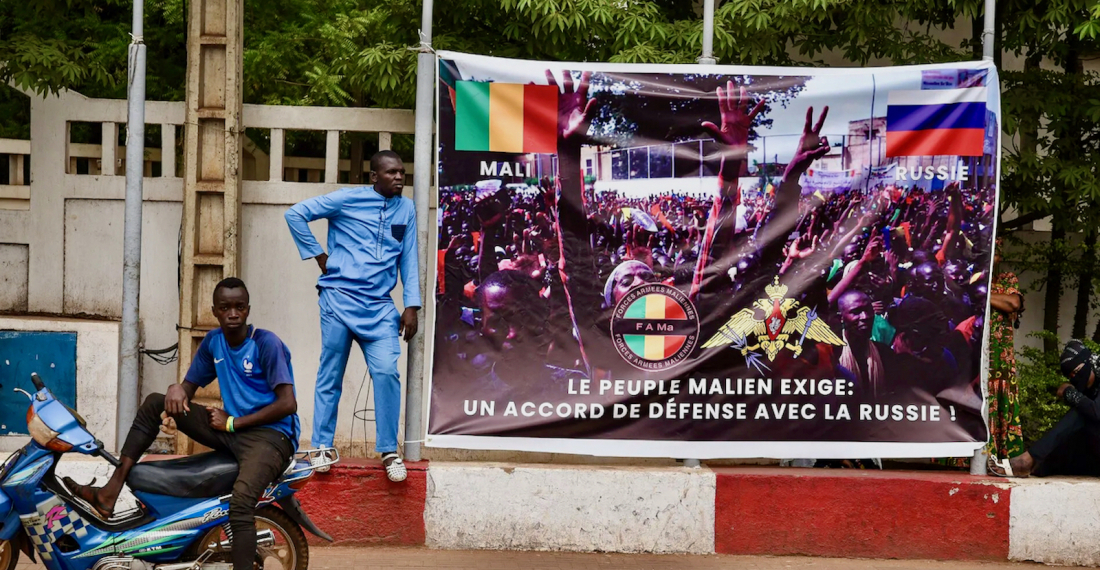While the world’s attention is focused on Russia’s invasion of Ukraine, Russia’s presence in Africa, and particularly in Mali, increasingly represents a threat to international security, writes Camille Victor for commonspace.eu.
Russia’s presence in Mali has generated considerable controversy since the end of 2021, with many Western powers denouncing the activities of the Russian “Wagner Group” paramilitary mercenaries in the country, accusing them of violating human rights and the rule of law. Indeed, while Mali had been cooperating closely with France in the fight against terrorism since 2013, the Malian junta that seized power in a coup in May 2021 has drastically changed its foreign policy, now turning to Moscow to help stabilise the security situation by employing the services of this shady Kremlin-linked private security group.
This major pivot of Malian foreign policy towards Russia comes as relations between Mali, its African neighbours, and the West, and France in particular, have continually deteriorated since May 2021. On the one hand, the Economic Community of West African States (ECOWAS) long condemned the Malian junta for its failure to respect its promises of a democratic transition initially scheduled for February 2022. ECOWAS also initially stayed true to its values by suspending Mali's membership of the community soon after the coup, and imposing strong economic and financial sanctions against the Malian military government on 9 January 2022. ECOWAS then lifted sanctions on 3 July 2022, following the government’s promise to hold elections in February 2024.
On the other hand, relations with France deteriorated sharply over the past year, thus paving a way for Russo-Malian rapprochement. Indeed, after nine years of military presence in Mali, first through Operation Serval in 2013 followed by Operation Barkhane from 2014 onwards, France was pushed out by Mali’s military authorities six months after the arrival of paramilitaries from the Wagner Group. Shortly after the junta expelled the French ambassador to Mali, the Élysée Palace decreed on 17 February 2022 that "the political and operational conditions were no longer met to remain engaged in Mali", and that France had therefore decided to reorganise Operation Barkhane "outside Malian territory". This resulted in the withdrawal of the last French troops from Mali on 15 August.

In a region crippled by insecurity for a decade, this development will likely generate significant political and economic risk further threatening national and regional stability. Russia deployed Wagner to the Sahel to counteract Western agendas and as an alternative to the G5 Sahel Joint Task Force; however, Moscow is now entangled in a power struggle between an anaemic Malian government, Islamist militants, and dissident forces, and may face a reaction if the military junta loses power or fails to transition to a democratic system. The Wagner Group's reputation for poor discipline and inadequate leadership also means that they are unprepared to replicate France’s stabilising presence, and are unlikely to limit their 1,000-strong force to only training small units and executive protection. Brutal tactics will most likely boost rebel recruitment, while state collapse may discredit Russia as a reliable partner or effective security supplier.
Since the arrival of Wagner in Mali, the number of human rights abuses against the population – which were which were already excessively high before the paramilitaries’ presence – are increasing in number, threatening national security. Indeed, an alliance with Moscow offers African governments the freedom to conduct counterterrorism and counter-insurgency operations without restrictive human rights obligations imposed by Western powers. According to a report by the NGO Acled, the Russian mercenaries targeted civilians in more than 70% of their activities. One example that remains in everyone's mind is the appalling massacre in the village of Moura in central Mali at the end of March 2022.
Moura was the object of an “anti-terrorist operation” carried out by the Malian army (FAMa) with the support of Wagner paramilitaries over several days, leaving 300 civilians dead, mainly men from the pastoralist Peuhl, or Fulani, ethnic group. According to a report issued by Human Rights Watch (HRW), the massacre was “the worst single atrocity reported in Mali's decade-long armed conflict”. Such abuses create additional instability and political risk as they further fragment Mali’s population by increasing entrenched tensions between its ethnic communities. Rebel recruitment will most likely be bolstered, and a more general loss of trust in the state’s ability to ensure the civilians’ security will probably lead to an even more significant lack of communication and cooperation between the population and security forces. This may also predispose a shift towards seeking out alternative security providers for protection, further undermining the FAMa’s ability to contain the terrorist threat.
Another consequence of Wagner’s presence in Mali is the ongoing failure to counter the rise of jihadist terrorism in the country, which not only represents a threat to national security but also jeopardises regional stability. Since the start of the Islamic State in the Greater Sahara (IS-GS) offensive in north-eastern Mali last March, more than 900 civilians have been massacred, mostly in the villages of Tamalat, Anderamboukane and Inekar. Whilst the Movement for the Salvation of Azawad (MSA) has ensured the protection of the populations in the north of the country for more than six months, it still seeks the FAMa’s assistance. However, the army seems unable to fulfil its role as a main security guarantor despite Wagner’s presence; so far, it has not deployed any men on the ground, neither at the time of the fighting, nor since then, to protect or rescue displaced civilians. Indeed, thousands of them are currently living in makeshift camps and seeking shelter in the towns of Gao and Kidal, or in Algeria. General Gomou's appeal asking them to take refuge in the big cities if anything illustrated how much the situation on the ground had deteriorated.

Despite its relatively new deployment in Mali, Wagner has already significantly impacted the security climate of the conflict-ridden country. Mirroring its influence in other African nations where it has embedded itself over the past years, such as the Central African Republic, Libya, Sudan, Madagascar and Mozambique, Wagner negatively impacts conflict dynamics through its operations, particularly civilian safety. As the group progressively expands its footprint, there is a considerable risk that additional regions may witness similar trends to those seen in Mali and neighbouring areas.
Given that Mali’s security is currently in the hands of forces that not only fail to effectively counter an increasing terrorist threat, but also to fail to respect human rights and the rule of law, all the while facing zero accountability for their abuses, ensuring that the junta upholds its commitment to conduct democratic elections in 2024 must remain a priority. In the meantime, an integrated security risk management and peacebuilding strategy should include measures that encourage transparency and accountability for abuses and breaches to the rule of law committed by security forces, notably through strengthening civilian institutions and oversight mechanisms.







